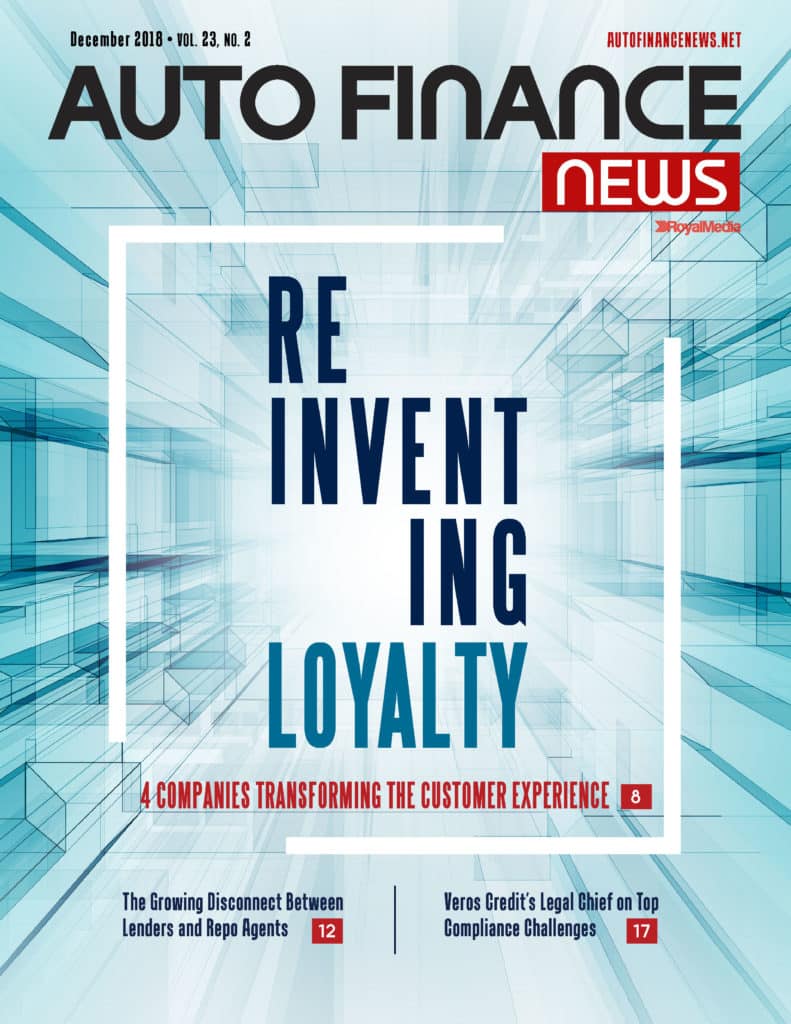
Editor’s Note: This story is originally featured in the December edition of Auto Finance News’ digital magazine, out now.
Customer experience is seen as the key to attracting and retaining consumers in an increasingly digital world.
Unfortunately, providing quick and easy interaction has not been auto financing’s strong point. Historically, car buyers have been left feeling overwhelmed with paperwork, confused by ancillary products, and exhausted from negotiating price options. However, providing a great customer experience is what creates today’s brand loyalty.
“There is power in brands that play an extremely strong role in society,” Grayson Brulte, president of consulting firm Brulte & Co., told Auto Finance News. “There will only be more play with businesses if consumers like and trust the brands they recognize.”
The auto finance community is getting the message. A number of forward-thinking lending and software companies, including Toyota Financial Services, Wells Fargo Auto, Nissan Motor Acceptance Corp., and CU Direct, are developing innovative features and transforming their customer service operations to better engage customers. What follows is a detailed look at some of the more interesting efforts.
Toyota Financial Services Opens Communications
Toyota Financial Services is well known as the captive that is innovative and takes the time to evaluate pilots, focus groups, and tests before rolling out new features. The way the captive approaches consumer experience initiatives is no different.
Among its latest initiatives are two developments aimed at improving customer communication. The efforts began after the captive evaluated feedback employees received from customers, said Anna Sampang, vice president of service operations. And many TFS customers have been asking about titles.
“One of the biggest demands from our consumers has been: ‘Where’s my title?’” Sampang said. As a result, TFS is launching a title tracker on its website that will allow consumers to monitor via the TFS website where their vehicle is in the titling process.
“As a consumer, I have to keep calling back to find out how the title progresses,” she said. Now, with the title tracker, a consumer can check in on the status. “It gives [consumers] comfort that there is action to their request, and they still have the choice to call their lender or dealer.”
The titling feature is now available to dealers and internal TFS staff, who say it enhances the amount of confidence they have when having a conversation with customers. TFS has not set a release date for the new feature, but Sampang said it will be rolled out “in the near feature.”
A second customer-experience initiative is a text service called Lease Maturity. The service pings lessees that their leases are coming to an end. Once a consumer opens the text, there will be a link directing consumers to a comprehensive checklist that provides all the information needed to prepare consumers for returning vehicles and what to expect at the end of the lease term. The service was rolled out in September.
“We want to provide proactive communication through the correct channel to our consumers,” Sampang said. “The campaign is designed to alert customers about their upcoming maturity and provide them a checklist to prepare consumers for returning the vehicle and what to expect after they finish their lease.”
Consumers these days expect a text channel for communication, and TFS says it’s responding to their preferences. “Consumers will simply get a [text] notification from their lender saying, ‘Your maturity is up,’” Sampang said.
As for consumer reaction to the new feature, “early indicators show that consumers appreciate a gentle reminder, as they often forget their maturity date,” Sampang said. “Consumers like transparency regarding what [consumer] obligations are and what the process will be,” she added. “Our goal is providing information and [limiting] the number of lease accounts that pass maturity, but our results are still pretty new.”

© Can Stock Photo / peshkova
Wells Fargo Auto Revamps Operations
Wells Fargo Auto has spent the past 18 months transforming its business to better serve its customers, Jerry Bowen, executive vice president, told AFN.
While the Wells Fargo & Co. brand has come under fire for improper sales practices, the auto unit is focused on creating a transparent relationship with customers with an emphasis on simplification wherever possible. “We’re investing in improving the customer experience from start to finish — including improving the onboarding experience and rewriting customer correspondence to feel more conversational,” said a Wells Fargo spokeswoman.
The company is also putting auto customer service team members through new training that focuses on active listening skills, building rapport, and understanding different social styles. “In addition, customer service representatives are now more empowered to make decisions that allow for first-call resolution,” the spokeswoman said. “And auto has eliminated some fees — like telephone payment fees — for its customers.”
The bank also recently trained team members who staff its mobile response units — large trucks that travel to areas affected by natural disasters — to answer customers’ questions about options available if they’ve been impacted by natural disasters.
“Part of [Wells Fargo Auto’s] business transformation includes looking for ways to improve the experience for consumers by finding ways to use technology to improve human interactions and give team members tools that make it easier for them to walk in its customers’ shoes,” according to the spokeswoman.
“We are continuing to transform Wells Fargo to deliver what customers want — including innovative, customer-friendly products and services — and evolving our business model to meet those needs in a more streamlined and efficient manner,” Chief Executive Tim Sloan said during a companywide town hall meeting in September.
The bank is considering digital innovations to meet all of its customer experience goals.
“We recognize that customers — both dealers and consumers — are looking for ways to make their auto financing experiences more informative and streamlined, and are increasingly leveraging digital to get there,” the spokeswoman said. “We are continually looking for ways to meet customers where they are and how they what to interact and provide more opportunities to engage with us digitally,” she added.
NMAC Targets Used-Car Market, Mobile Apps

© Can Stock Photo / happyalex
Among Nissan Motor Acceptance Corp.’s latest consumer experience initiatives are providing better service to used-car customers in partnership with CarFax and building out its mobile capabilities through a relationship with AutoGravity.
The lender says it’s also looking at new online payment mechanisms. For many OEMs, a strong certified pre-owned (CPO) program is a way to drive consumer loyalty. It allows off-lease vehicles to have a great landing spot and ensures continued brand loyalty.
“Our service level on the consumer side have improved over the last year,” said Kevin Cullum, president of NMAC. “A strong CPO option, as an example, is a great way to bridge that gap for customers who may be used to the brand but cannot necessarily afford the cost of a new car payment yet.”
As the U.S. Federal Reserve gradually increases interest rates, the demand for used vehicles rises with it, Cullum said. “Our CPO program continues to grow on a monthly basis and year over year, and I attribute that increase not only to awareness of the brand but also to the residual impact of rising interest rates that will increase the cost of ownership and financing for consumers.”
To that end, Nissan expanded the role of Carfax in the Nissan and Infiniti CPO programs, the companies announced earlier this year. The new expansion means consumers receive service and recall alerts for their vehicles from Carfax via the myCarfax app.
The app displays consumers’ service histories and alerts consumers when it’s time for scheduled maintenance such as oil changes, tire rotations, vehicle registration, and safety and emissions inspections. The Nissan or Infiniti dealer is also designated as the customer’s favorite shop within myCarfax.
The enrollment option is new, but Carfax and certified Nissan and Infiniti dealers have worked together since 2012 to run Carfax reports on all CPO-eligible vehicles.
“Nissan’s decision to register their CPO customers with myCarfax helps reduce the cost of car ownership while increasing certified dealer revenues,” Vern Poyner, general manager at Carfax, said in a statement. Nissan North America is the first to make customer enrollment in myCarfax part of the CPO purchase process.
Aside from a focus on its CPO program, NMAC looks to “provide consumers the most seamless automotive financing process possible,” Cullum said. “We use smartphones to manage many aspects of our lives, so it’s only natural for digital to be the next evolution in automotive financing.”
To that end, NMAC is working with AutoGravity, the fintech company that allows users to find vehicle financing options through its mobile app. The captive’s offerings are now available on the platform. Consumers shopping on AutoGravity for Nissan’s vehicles, including the luxury Infiniti brand, have access to the captive’s financing options.
NMAC says users shopping across a wide variety of brands will appreciate the rates a captive can provide. “With our participation on the AutoGravity app, we are able to utilize this cutting-edge technology to connect with digital-savvy consumers and provide them with NMAC loan and lease preapproval options,” Cullum said.
A well-designed mobile app has become one of the most critical drivers of customer satisfaction with auto lenders, according to J.D. Power’s 2018 U.S. Consumer Financing Satisfaction Study.
“As the auto shopper journey becomes increasingly digital, it’s critical for auto lenders to get the mobile app formula just right,” said Jim Houston, senior director of automotive finance at J.D. Power.
“While mobile app utilization is still highest among younger generations, older customers who interact with auto lenders via mobile app experience even higher overall satisfaction than their younger counterparts,” Houston said. “Mobile is no longer a generational or niche offering; it is now the window into the auto lending experience.”
Additionally, NMAC is looking to create more channels to allow consumers to submit payment via text or through an online portal, Brian Massey, NMAC’s director of collections and loss recovery, told AFN.
“We’re looking at different ways for customers to be able to make those payments because so many people are moving to mobile,” Massey said. “You’ve got to be able to make that process easier.” What it comes down to is loyalty, and the loyalty that comes with being a captive, Massey added. “Between leasing and retail, with Nissan and Infiniti [we] try to help customers go back to a Nissan-Infiniti store for their next car. It’s very important to us, and it’s very important to the motor company, as well.”

© Can Stock Photo Inc. / sqback
CU Direct Provides Machine Learning Tools
CU Direct, a technology developer that works with more than 1,100 financial institutions, is helping credit unions make better underwriting decisions with a machine-learning-based loan origination system.
CU Direct’s product, called Lending 360, uses machine learning, or ML, which is a form of artificial intelligence that can quickly sort through massive amounts of data, find patterns, and make predictions.
For credit unions, it automates much of the loan approval process. And, of course, it speeds loan approval notifications, creating a good customer experience. Lending 360 is used by more than 135 credit unions including Allegiance, Premier America, and Vantage West credit unions.
In November, First Financial of Maryland Federal Credit Union, with $1.1 billion in assets, became the latest to sign on. Dan Kriebel, First Financial’s chief lending officer, said that the financial institution’s quest to find an automated underwriting solution was centered around customer service.
“Through our RFP process, we reviewed four major industry providers, with our primary objectives being to provide members with a more simplified, convenient, and streamlined lending experience,” Kriebel said in a statement. “Our primary objectives being to provide members with a more simplified, convenient, and streamlined lending experience.”
Specifically, the credit union was looking for a loan origination system with strong workflow efficiency, compliance, cost, reporting capabilities, ease of installation and execution, and cultural compatibility, Kriebel said, adding that the lender found everything it wanted in Lending 360.
While using ML to make loan origination decisions is considered innovative today, it won’t be for much longer, according to Brian Hamilton, vice president of innovation at CU Direct. “Today [ML] is a cool, competitive advantage, but within two years, it will be table stakes, so I’m encouraging the movement to start acting on this today.”
Source : AutoFinanceNews











